Gentle Readers: David Shapard, author of five annotated editions of Jane Austen’s novels – all but Mansfield Park, which is due out next year – will be joining the JASNA Vermont Region next week at the Burlington Book Festival. He will be speaking on “The World of Jane Austen and her Novels,” offering us a peek into the society of early 19th-century England that dominates her novels, with a focus on the position and customs of the controlling landed elite, and the role of women in this society. I welcome David today for a Q&A about his love of Jane Austen and his excellent annotated editions. If you have any questions for him, please do comment at the end of this post – but better yet, if you are in the area next weekend, please join us at his talk – Saturday September 20, 2014, 1:30-2:45 at the Fletcher Free Library, 235 College St, Burlington VT. [for more info: September 2014 flyer]
*********
So welcome David – thank you for being so gracious in answering all my questions!
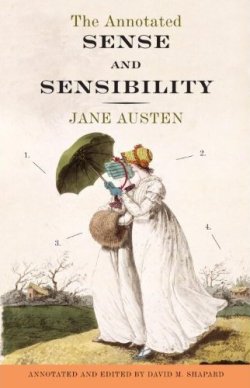 JAIV: To start off, why do you think Jane Austen still speaks to us 200 years after she first published her Sense and Sensibility in 1811?
JAIV: To start off, why do you think Jane Austen still speaks to us 200 years after she first published her Sense and Sensibility in 1811?
DS: I think Jane Austen interests us partly because she is so good, i.e. quality will out. I believe she is the best novelist in the English language, and that gives her a bedrock appeal, one she has had for a very long time (even if she has not always been the object of as much enthusiasm as today). With her you have well-constructed plots, brilliantly delineated characters, interesting and profound themes, and superb language – meaning excellence in all the major elements of a novel. One symptom of this is the variety of reasons people have for appreciating Austen: people, in giving their reasons, have cited, among other things, her comedy, her poignant romances, her keen insight into human psychology, her careful depiction of society, and her moral messages. With so many strong elements, she can appeal to an array of tastes and interests. Another reason is that, even though her novels are set firmly within her own time, she was looking at many matters that transcend that time. Her focus is on basic matters that people always have to deal with, whom to marry, how to relate to other people, how to judge right and wrong, how to cope with the difficulties of life. Her characters personality traits, feelings, relationships, and moral dilemmas are all ones that are still frequently found today, so the insights and lessons presented in her novels can still ring true today.
JAIV: Whatever got you so interested in Jane Austen to first take on annotating Pride and Prejudice (in 2004)?
DS: I had long loved Jane Austen, for many of the reasons described in my previous answer. But there were several precipitating factors that spurred me to attempt an annotated version of her novel. In the six months or so preceding the decision I had begun to read and sometimes participate in an online forum devoted to Jane Austen, The Republic of Pemberley. This, in addition to being very enjoyable, helped me appreciate how much interest and discussion even very specific points in Austen could generate. That eventually gave me the idea of doing a running commentary on her novels, in which various passages would be examined and elucidated. One feature of Austen is that she is a very subtle author, who makes many of her points quietly and unobtrusively; she also is one who is especially good in the details. For this reason the standard format for analysis of a novel, an article or book examining it as a whole, and looking at the overall theme, would inevitably miss much of what makes her so worth reading. But these elements could be brought out through a more minute analysis of the entire novel. At that time this idea was simply one for the indefinite future. But soon after events occurred that convinced me that I was unlikely to procure a 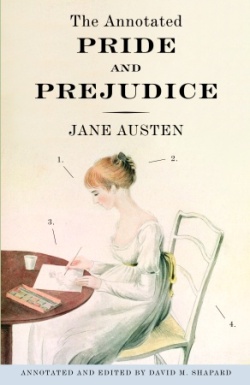 permanent, full-time position teaching at a college or university, the profession I had been pursuing for a number of years. I decided to turn to writing, which I had long seen as my principal alternative. I had a longstanding idea for a book, but work on it soon persuaded me that it was the great idea I had earlier thought. While casting around for other ideas I suddenly thought again of my Austen project. I had seen annotated versions of other classic works, and liked them. I also knew there was a large market for anything related to Austen. So I decided to try this, and I quickly realized that I had made an excellent choice.
permanent, full-time position teaching at a college or university, the profession I had been pursuing for a number of years. I decided to turn to writing, which I had long seen as my principal alternative. I had a longstanding idea for a book, but work on it soon persuaded me that it was the great idea I had earlier thought. While casting around for other ideas I suddenly thought again of my Austen project. I had seen annotated versions of other classic works, and liked them. I also knew there was a large market for anything related to Austen. So I decided to try this, and I quickly realized that I had made an excellent choice.
JAIV: We think so too! ~ Which novel is your favorite? And why? And did your favorite change after your in-depth readings and the historical research?
DS: Mansfield Park is my favorite overall. I like what I consider its density, the many story lines and the many different complex subjects it explores. At the same time, while the plot is very eventful, it does not rely at all on improbable coincidences, as others of Austen do to some degree. Finally, it has four different characters – Fanny, Edmund, Mary, and Henry – whose inner life is shown, who change over the course of the novel, and who experience serious inner conflicts. In other Austen novels there are only one or two characters about whom that could be said. This has not really changed because of my doing the annotated books. The main change that brought about was simply to increase my appreciation for each one; this was especially true for the four I consider her strongest, Pride and Prejudice, Persuasion, Emma, and Mansfield Park (I am only part way through doing the last).
JAIV: Why the long gap before the next annotated edition came out, Persuasion in 2010? And when does Mansfield Park come out?
DS: I had first done Pride and Prejudice because I knew it was by far the most popular. I held off doing others until I knew how well it did, and it took a number of years before it succeeded. I wasn’t able to sell it initially, then I self-published it, then somebody at Random House noticed it and approached me about signing with them. After that came out, and did well, my editor there approached me again about doing the other Austen novels. Mansfield Park will come out next year, probably late in the year. The gap between it and the previous one, Northanger Abbey, is the result of my having devoted much of the last year to working on a special enhanced version of Pride and Prejudice that is designed for an iPad. It comes out in a few weeks, and I am very excited about it, but it has significantly delayed Mansfield Park.
– 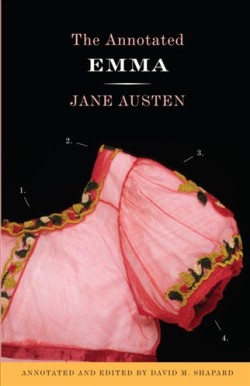 JAIV: Does Jane Austen get anything wrong?
JAIV: Does Jane Austen get anything wrong?
DS: She got very little wrong. All I have noticed is a mistake on a date of a letter in Pride and Prejudice, and two specific events, one in Emma and one in Sense and Sensibility, that are probably wrong, based on what I have read about the history of the time. There are also at least a couple places where a quotation from a poem or other writing is off. But that is really a remarkable record, especially when you consider that she didn’t have a large library to consult for quotations or other references.
JAIV: What do you think of the films? – do you have a favorite? Any that you find completely appalling?
DS: I like the films overall. They are no substitute for reading the novels, since much of what is in there cannot be shown on film. But the films can do things the novels cannot, such as show houses and carriages and costumes, as well as specific places. That is something I have also done in my books, and the visual adaptations go even further in that direction. It is also nice to see the characters brought to life by real people, even though I inevitably judge them according to how well they correspond to the characters in the novel and often find them wanting, at least in certain respects. In terms of favorites, I would probably say the Sense and Sensibility written by Emma Thompson. I also like the Persuasion with Amanda Root and the Pride and Prejudice miniseries with Jennifer Ehle and Colin Firth. I did not like overall the series of TV adaptations that appeared a few years ago, and I thought the Mansfield Park of that series was the worst of any adaptation I have seen.
JAIV: Oh! I agree with you there, though the Persuasion with Anne running around the street in a panic while reading the 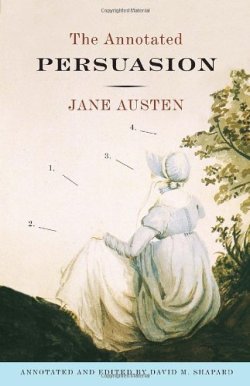 Captain’s letter is embarrassing to watch as well! ~ Tell us something about your writing process: when and how?
Captain’s letter is embarrassing to watch as well! ~ Tell us something about your writing process: when and how?
DS: I usually start by reading through the novel several times, and as carefully as possible; while doing so I note any possible point I might wish to make or passage I wish to explore further or think about. I also listen to audio versions with the same purpose in mind, for I find that in hearing it I sometimes notice things I don’t notice when simply reading it. Then for the historical references, which is what requires the most effort, I organized all the points or topics I want to look at by subject matter, and start reading, or rereading, various books related to those topics. I also, at some point, read through commentaries on the novel to see what additional insights they offer, re-examine Austen’s letters and other biographical material to see what’s relevant there, and look at the words I might need to define; I use here a pre-existing list of words with different meanings in Austen’s time, supplemented for what I may have noticed in addition through my reading. As I do all these things I often go ahead and write the annotations appropriate to what I’ve just found. When all that is done I begin to go through the book chapter by chapter and insert whatever points have not been made. After that it’s just a series of reading over again and making corrections, by myself and by my editor, until the text is finally settled, and also adding other material like illustrations and maps.
JAIV: How do you think your annotated editions compare to the Harvard University annotated series that began in 2010 with P&P [their Mansfield Park is due out in the Fall of 2015, edited by Deidre Lynch]
DS: I am not that familiar with these other annotated versions. I know they are in hardcover and are significantly larger (and therefore also more expensive); they also have some color pictures. In terms of the content, my sense is that they have fewer annotations. In the case of the one that I have read, the Pride and Prejudice, it does have fewer annotations overall. Some of its annotations, especially definitions of words, are similar to mine. The principal difference is that it focuses less on historical background – there are definitely fewer annotations there – and more on literary interpretations. It has a number of annotations that explore debates between different literary scholars regarding points in the novel, something mine does not do.
JAIV: The covers for each work: did you choose them yourself? – and the idea of annotating them is a very good one – gets the reader right into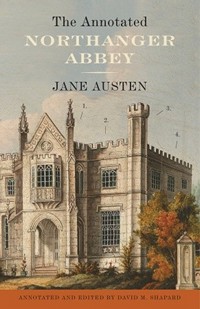 ‘reading the annotations’ mode!
‘reading the annotations’ mode!
DS: The publisher comes up with the cover, along with the overall design, though they always show it to me for my approval. They had the idea of doing annotations for the cover, but I am the one who comes up with the annotations themselves. That is also part of the process of agreeing on a cover picture: it has to be one that I think will be suitable for annotating.
JAIV: I know you mention “plot disclosures” at the beginning of the book to alert readers that some of your notes might contain “spoiler alerts” – did you get complaints about that when the first edition of your P&P first came out?
DS: Yes, I did get some complaints about my first edition of Pride and Prejudice. I had envisioned the book being used by many people as a reference, one they would turn to whenever they were curious about a specific point; thus I didn’t worry so much about plot spoilers. But it seems that most people have simply read it through, as with most books, and that many are reading the novel for the first time. As a consequence, I have tried harder in later editions to avoid giving anything significant away. That has constrained me in some respects, because important points about a passage often relate to something that happens later, but I think it’s worth it to avoid spoiling the surprise for the reader. The one important exception here was in Emma: it centers around several mysteries, especially one big one, and I felt that a valuable feature of an annotated edition would lie in showing how all sorts of apparently minor and innocuous actions take on a completely different significance in light of what we find out in the end. So in the case of the annotations for those passages, I put “CAUTION: PLOT SPOILER” at the start to warn off any first-time readers who wished to preserve the surprise.
– JAIV: Are you a book collector? And Jane Austen in particular? – if so, what is your favorite edition of any of her works, and why?
DS: I like to buy books and I have a large library, but I am not a collector in the sense of seeking out rare or special editions. The editions of Jane Austen I have used are those that are most scholarly and authoritative: these are an Oxford edition that first came out in the 1920’s, and the even more exhaustive Cambridge editions (with many notes of their own) that have come out within the last decade. 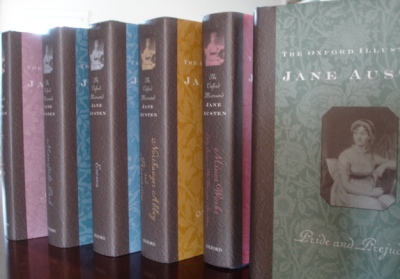 JAIV: You are nearly done with annotating the six novels – what’s up next? Will you annotate the minor works or any of the Juvenilia?
JAIV: You are nearly done with annotating the six novels – what’s up next? Will you annotate the minor works or any of the Juvenilia?
DS: I am close to being done with annotating the novels. It is possible the publisher will also want to do enhanced editions of other Austen novels; I’m sure that will be determined by how well the Pride and Prejudice about to appear does. I have thought about annotating other Austen works, but I am not sure if there is sufficient demand for that. I also have a few ideas for novels of my own, some related to Jane Austen. But right now I am keeping my options open and waiting to see what develops out of my existing books.
Huntington Library Regency Exhibit
JAIV: Why do you think the modern reader should have a better understanding of the society of the Regency Period? and can the reader still enjoy Jane Austen without having to read annotated versions?
DS: I think that understanding the Regency period helps greatly in understanding Jane Austen. Of course, millions of people have enjoyed and appreciated Jane Austen over the years without having any particular knowledge of her period, beyond what they could pick up from the novels themselves. I know I was in that situation when I first read her. So such knowledge is in no way a precondition. But I think that if one understands the historical background, all sorts of important events in the novels become much clearer and more comprehensible, and all sorts of particular details, ones the reader probably passed over without much thought, become significant. The story then springs to life in a variety of new ways.
*************
Thank you David again for joining us here at Jane Austen in Vermont! We look forward to welcoming you to the real Vermont next weekend, where there will be an opportunity at the Book Festival to purchase all your Jane Austen annotated editions and have you personally sign them! I will also add here that David will be the leader on a tour next spring to Jane Austen’s England. The trip will be through Edventures, a tour group that offers educational trips to many parts of the world – or as they say, “Edventures – Adventure Travel That Educates.” You can read more about it here: http://goedventures.com/ – and click here for the flier with details: Huber-Jane Austen 2015 Itinerary April 21 Any questions for David? – please comment below! Further reading:
- You can find the annotated editions here at Random House: http://www.randomhouse.com/book/search/search.php?title_subtitle_auth=david+shapard&x=0&y=0
- Pride and Prejudice here at Amazon: http://www.amazon.com/Annotated-Pride-Prejudice-Jane-Austen/dp/0307278107
- David was interviewed for his local library last year: you can view that here: http://vimeo.com/67129800

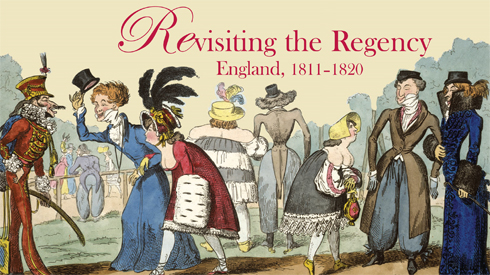

Fantastic interview — thanks, JAIV! I’ve long been a fan of David Shapard’s P& P.
LikeLiked by 1 person
Hi Mr. Shapard!
Thank you so much for your books! I love them so much I made sure to wrap them and bring them in my carryon bag when I moved to the Dominican Republic a few months ago. I have always loved Jane Austen since as far back as I can remember but with your books they have really come to life. It’s kinda like that moment in the Wizard of Oz when it goes from black and white to color, her books have “color” now that I am able to understand so much more about the intricacies of the story and the culture. My favorite is Persuasion and after reading your version I love it even more. I had always wondered about the part where Anne’s cousin Mr. Elliot held the hand of Mrs. Clay. Until your book I had never understood what it was about that that was so eye opening for Anne. I have really taken to learning more about the Regency era, I love it but I would never want to live in it (I like my toothbrush and real underclothes :-).
I first picked up your Pride and Prejudice version because I was looking for a new copy and it was the only one they had, a good thing for me as it turns out. After reading it I had finally understood so much more. You really should not have waited so long for the others, most specifically Persuasion. I am not always a patient person, especially when it comes to books. I will accept the apology I am sure you are offering.
I look forward to your version of Mansfield Park, it is my 2nd favorite right after Persuasion. And I think the other annotated editions are more for show and less for those who want to truly understand the books.
Thanks again!
Danielle C
LikeLike
Also can you please let us know when the enhanced version will come out and where we can buy it. Thanks!
LikeLike
Reblogged this on Living Adventurously and commented:
For my Jane friends! Great interview
LikeLike
Thanks for the reblog Emily!
LikeLike
Wonderful interview! I have read and enjoyed all your annotated versions of the novels and very much look forward to Mansfield Park as I, too, am a fan of this underappreciated novel.
LikeLike
Pingback: Le edizioni annotate di Jane Austen a cura di D. Shapard - Jane Austen Society of Italy (JASIT)Jane Austen Society of Italy (JASIT)
I enjoyed your talk last week at JASNA-VT, David. Is it possible to preorder the special enhanced version of Pride and Prejudice designed for iPad? Do you have an exact release date? I’m actually teaching P&P this week and next, and would love to show your iPad version to my class.
LikeLike
I especially enjoy your annotated series and wonder if you would think of doing an annotated edition of Becoming a Marchioness by Frances Hodgson-Burnett. I have read all your Jane Austen books and would the same insight into the Making of a Marchioness. There are several things in the book which I don’t fully understand due to subtlety of meanings. Thank you.
LikeLike
Hello Susan, yes I agree that David Shapard’s annotations make the time period clearer for the 21st-century reader. I will pass on your request re: Burnett – who knows, it might send him in a new direction – but right now I am waiting for his Mansfield Park edition, due out this April!
LikeLike
Great blog. As one who is starting all of Shapard’s annotated Austen novels, I would like to invite him to speak at a JASNA meeting. Is it possible to obtain an email or a web address where I can reach him?
LikeLike
Hello – where are you located? I’ll check with David to see if I can give you his contact information – or I can give him your email. Let me know – you will enjoy his talks!
LikeLike